01 - India's Claim for Pacifism & Arms Modernization: Changing Postures and Outcomes ...
http://dx.doi.org/10.31703/gpr.2021(VI-I).0110.31703/gpr.2021(VI-I).01 Published : Mar 2021
-
This article highlights the aims under Indian Prime Minister Modi concerning to foreign policy of India since 2014. Moreover, it determines those factors that are working as an impetus along with great powers intentions and motives behind them in playing such geostrategic politics in different dimensions, specifically in the nuclear relationship of India and Pakistan. It will also be summarised th... Details
-
No First Use, Pacifism, Interests-Roles, Foreign Policy, Future Prospects, Pakistan, India
-
(1) Muhammad Umer Hayat
Senior Assistant Professor, Department Humanities and Social Sciences, Bahria University, Islamabad, Pakistan.
(2) Alina Zaid
MS Scholar, Department of International Relations, Bahria University, Islamabad, Pakistan.
(3) Farrukh Shahzad
Assistant Professor, Department of Media Studies, Bahria University, Islamabad, Pakistan.
02 - Leadership, Idiosyncrasies, and Political Behaviour: Personality Analyses of Pre...
http://dx.doi.org/10.31703/gpr.2021(VI-I).0210.31703/gpr.2021(VI-I).02 Published : Mar 2021
-
How do leaders' idiosyncrasies are developed, and how do these, in turn, impact their political behaviour? This study traces the idiosyncratic behaviour of Presidents Andrew Jackson and Donald Trump. It details four historical traditions - Hamiltonian, Wilsonian, Jeffersonian, and Jacksonian. The study expands upon Jacksonian tradition and sees that how Trump pursued this tradition and how is his ... Details
-
Andrew Jackson, Donald Trump, Idiosyncrasy, Leadership, Political Personality profiling, Populism
-
(1) Muhammad Nadeem Mirza
Faculty Member, School of Politics and International Relations, Quaid-i-Azam University Islamabad. Pakistan.
(2) Summar Iqbal Babar
Faculty Member, School of Politics and International Relations, Quaid-i-Azam University Islamabad. Pakistan.
(3) Farheen Qasim Nizamani
Faculty Member, Department of Media & Communication Studies, University of Sindh, Jamshoro, Sindh, Pakistan.
03 - Preserving Distinctive Identity through Cultural Revival: An Analysis of Sindhi ...
http://dx.doi.org/10.31703/gpr.2021(VI-I).0310.31703/gpr.2021(VI-I).03 Published : Mar 2021
-
Islam The paper intends to address the fundamental question that whether the movement for cultural revival in Sindh during the One-Unit period was a surrogate effort for the achievement of political goals or it was an effort by the Sindhi intelligentsia to protect Sindhi culture against the government's patronized onslaught of foreign cultures and to ensure the survival of cultural personality of ... Details
-
Sindh, Culture, Ethnic, Identity, Indigenous/Native Sindhi's
-
(1) Sultan Mubariz Khan
Assistant Professor, Department of Political Science & IR, University of Gujrat, Gujrat, Punjab, Pakistan.
(2) Misbah Shaheen
Lecturer, Department of Political Science & IR, University of Sargodha, Sargodha, Punjab, Pakistan.
(3) Muhammad Jawad Hashmi
Lecturer, Department of Political Science & IR, University of Gujrat, Gujrat, Punjab, Pakistan.
04 - Post 9/11 Trends: Bush to Obama to Trump (Multilateralism and Peace Initiatives ...
http://dx.doi.org/10.31703/gpr.2021(VI-I).0410.31703/gpr.2021(VI-I).04 Published : Mar 2021
-
The overall U.S. strategy in Afghanistan lacks clarity and consistently coordinated efforts/policies to bring peace in the war-torn country. From the Bush to Obama and Trump administrations, the situation remains complex, and ambiguity prevails on the future of Afghanistan and achievements; therefore, the U.S. needs to think outside the box to emerge from this turbulent 19 years-long war. No singl... Details
-
Post 9/11, Anti-Terrorism, Multilateralism, Peace Initiatives, Foreign Policy, Afghan War, Obama, Peace Building, Pakistan
-
(1) Waseem Khokhar
Ph.D. Scholar, Quaid-e-Azam University, Islamabad, Pakistan.
(2) Tahir Jamil
Assistant Professor, Area Study Centre, Quaid-e-Azam University, Islamabad, Pakistan.
(3) Qamar Abid Hussain
Ph.D. Department of Pakistan Studies, Bahuddian Zakariya University, Multan, Punjab, Pakistan.
05 - Impact of China-Pakistan Economic Corridor (CPEC) on National Development and In...
http://dx.doi.org/10.31703/gpr.2021(VI-I).0510.31703/gpr.2021(VI-I).05 Published : Mar 2021
-
Islam This research focuses on the impact of the China Pakistan Economic Corridor (CPEC) on the national development and societal integration in Pakistan. Substantial literature is available on the geo-political and geo-economics of CPEC; however, a literature gap exists on the interplay of the domestic politics of Pakistan and the CPEC. I want to explore the intrinsic linkage of federal and provi... Details
-
CPEC, National Development, National Integration, Disharmony
-
(1) Shabnam Gul
Assistant Professor, Department of International Relations, Lahore College for Women University, Lahore, Punjab, Pakistan.
(2) Waseem Ishaque
Assistant Professor, Department of International Relations, National University of Modern Languages (NUML), Islamabad, Pakistan.
(3) Muhammad Faizan Asghar
MPhil, Peace & Counter Terrorism Studies, Minhaj University Lahore, Punjab, Pakistan.
06 - Pakistan USA Relations: Prospects & Dynamics in a New World Order...
http://dx.doi.org/10.31703/gpr.2021(VI-I).0610.31703/gpr.2021(VI-I).06 Published : Mar 2021
-
The diplomatic relationship between Pakistan and United States is a matter of importance. It is a debate of strategic partnership and a tale of friendship. Systematically the relationship was born in 1947 to have a direct entry of the United States in the region of South Asia. Hence both states worked on a bundle of agreements to strengthen their relationship. However, there was a turn of events t... Details
-
Pakistan, USA, New World Order, Ayub khan Era, Cold War
-
(1) Asmatullah
PhD Scholar, National Institute of Pakistan Studies, Quaid e Azam University, Islamabad, Pakistan.
(2) Hanif Khalil
Associate Professor, National Institute of Pakistan Studies, Quaid e Azam University, Islamabad, Pakistan.
07 - Role of CPEC in Energy and Industrial Development of Pakistan...
http://dx.doi.org/10.31703/gpr.2021(VI-I).0710.31703/gpr.2021(VI-I).07 Published : Mar 2021
-
China Pakistan Economic Corridor (CPEC) has been identified as a "game-changer" for Pakistan. Pakistan is facing two vital issues in recent times; one, the energy crisis and second, the lack of industrial capabilities. This paper explores that how CPEC is helpful in resolving the issue of the energy crisis in Pakistan. The industrial development in Pakistan through the CPEC project is also discuss... Details
-
Pakistan, CPEC, Energy. Industry
-
(1) Muqarrab Akbar
Chairman, Department of Political Science, Bahauddin Zakariya University, Multan, Punjab, Pakistan.
(2) Muhammad Tahir Hassan
Assistant Professor, Department of Mechanical Engineering, Bahauddin Zakariya University, Multan, Punjab, Pakistan.
(3) Mian Tahir Ashraf
Assistant Professor, Department of International Relations, Bahauddin Zakariya University, Multan, Punjab, Pakistan.
08 - Political Content and Television Channels in Pakistan: Investigating the Profess...
http://dx.doi.org/10.31703/gpr.2021(VI-I).0810.31703/gpr.2021(VI-I).08 Published : Mar 2021
-
This study analyzes the content and Presentation of the Panama issue in Pakistan's two leading TV channels; Geo TV and ARY TV. Through the content analysis technique, it was found that both the channels professionally present the controversy on the Panama issue in terms of camera techniques, music, and other production skills. However, the content was very sensational on both channels. Separately,... Details
-
Sensational Presentation, Sensational Coverage, Professional, Panama Leaks, ARY, Geo News
-
(1) Ayesha Zahid
Visiting Lecturer, Department of Mass Communication, Bahria University Islamabad, Pakistan.
(2) Malik Adnan
Assistant Professor, Department of Media Studies, The Islamia University of Bahawalpur, Punjab, Pakistan.
(3) Ayesha Qamar
Lecturer, Department of Communication and Media Studies, Fatima Jinnah Women University, Rawalpindi, Punjab, Pakistan.
09 - Intelligence Cooperation and National Security Shift of Pakistan...
http://dx.doi.org/10.31703/gpr.2021(VI-I).0910.31703/gpr.2021(VI-I).09 Published : Mar 2021
-
The concept of intelligence cooperation and national security is not new, particularly after realism which interpreted these concepts with different perspectives. International states are sovereign, and they got the capacity to secure themselves from internal and external threats, i.e., army is a key to state security as it can attack the enemy to protect its borders. States are not all the time h... Details
-
Conflict, Security, Intelligence, Cooperation
-
(1) Muhammad Faizan Asgher
MPhil, Peace & Counter Terrorism Studies, Minhaj University Lahore, Punjab, Pakistan.
(2) Shabnam Gul
Assistant Professor, Department of International Relations, Lahore College for Women University, Lahore, Punjab, Pakistan.
10 - Frontier Crimes Regulation (FCR): From Introduction to Abolition...
http://dx.doi.org/10.31703/gpr.2021(VI-I).1010.31703/gpr.2021(VI-I).10 Published : Mar 2021
-
When the British arrived at the North-West Frontier, it adopted several special measures to crush the resistance from Pashtun tribes and safeguard colonial interests. One of these special measures was the introduction of FCR, which was introduced to increase the conviction rate in criminal cases without the requirements of due process of law. This paper tries to present a detailed account of FCR f... Details
-
FCR, Jirga, FATA, Territorial Responsibility, Collective Responsibility
-
(1) Noor Hamid Khan Mahsud
Associate Lecturer, Department of Pakistan Studies, The Islamia University of Bahawalpur, Punjab, Pakistan.
(2) Mian Saeed Ahmad
Assistant Professor, Department of Pakistan Studies, The Islamia University of Bahawalpur, Punjab, Pakistan.
(3) Wasai
PhD Scholar, Taxila Institute of Asian Civilizations, Quaid-e-Azam University Islamabad, Pakistan.
11 - Political Discussions on Social Media in Pakistan and Obstinate Partisanship...
http://dx.doi.org/10.31703/gpr.2021(VI-I).1110.31703/gpr.2021(VI-I).11 Published : Mar 2021
-
With the rise of social media over the last two decades, people have become more polarized and rigid in their views. Social interactions on social media networks are affecting political behaviors and making people obstinate partisans. The term obstinate partisanship was coined by Ardevol-Abreu and Gil de Zuniga (2020) and referred to the blind, unconditional loyalty to a certain political party. T... Details
-
Offline Political Discussions, Social Media Use, Online Political Discussions, Echo Chambers, and Obstinate Partisanship
-
(1) Ifra Iftikhar
Associate Professor, Lahore Garrison University, Lahore, Punjab, Pakistan.
(2) Irem Sultana
Assistant Professor, Government College University, Faisalabad, Punjab, Pakistan.
(3) Malik Adnan
Assistant Professor, Department of Media Studies, The Islamia University of Bahawalpur, Punjab, Pakistan.
12 - National Action Plan and Universities: An Assessment of Students Perception in M...
http://dx.doi.org/10.31703/gpr.2021(VI-I).1210.31703/gpr.2021(VI-I).12 Published : Mar 2021
-
The study aimed to assess students perceptions of the National Action Plan and the impact on the attitudes of South Punjab University students. The study was reserved for male and female students studying at selected universities in South Punjab in 2016. Systematic random sampling was used to draw the sample. The total sample consists of 539 students. A questionnaire (5-point Likert Scale) was pre... Details
-
Deteriorate, Abstain, Intimidate, Legitimate, Execution, Combating, Crackdown, Jurisdiction, Security, Indispensable
-
(1) Asghar Ali
PhD Scholar, Department of Education, The Islamia University of Bahawalpur, Punjab, Pakistan.
(2) Muhammad Nadeem Iqbal
Assistant professor, Department of Special Education, University of Okara, Punjab, Pakistan.
(3) Muhammad Ramzan
PhD Scholar, Department of Education, The Islamia University of Bahawalpur, Punjab, Pakistan.
13 - An Assessment of the Emergence of Muttahida Majlis-e-Amal (MMA) in Khyber Pakhtu...
http://dx.doi.org/10.31703/gpr.2021(VI-I).1310.31703/gpr.2021(VI-I).13 Published : Mar 2021
-
Though Pakistani politics is heavily influenced by religion assumed to be the reason d'etat of the creation of Pakistan, prior to 2002, religious, political parties had never achieved effective electoral results. The October 2002 elections for the National and Provincial Assemblies were a turning point for the religious, political parties in the history of Pakistan. It was the first time that a co... Details
-
Muttahida Majlis-e-Amal (MMA), Khyber Pakhtunkhwa, Pakhtun Nationalism, Religious Political Parties, Election
-
(1) Jamal Shah
Associate Professor, Department of Political Science, Government Post Graduate College, Mardan, KP, Pakistan.
(2) Zahir Shah
Assistant Professor, Department of Political Science, Abdul Wali Khan University, Mardan, KP, Pakistan.
(3) Syed Ali Shah
Assistant Professor, Department of Pakistan Studies, Abdul Wali Khan University Mardan, KP, Pakistan.
14 - Zionism and Identity Crisis: Ethnic Conflict between Israelis and Palestinians...
http://dx.doi.org/10.31703/gpr.2021(VI-I).1410.31703/gpr.2021(VI-I).14 Published : Mar 2021
-
The Palestine issue is attributed to be the most complicated problem in the region of the Middle East. However, few researchers analyze the problem through the lens of ethnic conflict. This research paper investigates that the use of Zionism as a metaphor for colonialism and its role in fostering an ethnic conflict between Israeli and Palestinians. Qualitative content analysis is used to analyze s... Details
-
Ethnic Conflict, Zionism, Colonialism, Identity, Ethno-Nationalism, Secession
-
(1) Muhammad Owais
Assistant Professor, Department of Political Science and International Relations, University of Management and Technology, Lahore, Punjab, Pakistan.
15 - Women's Emancipation during Musharraf Era (1999-2008)...
http://dx.doi.org/10.31703/gpr.2021(VI-I).1510.31703/gpr.2021(VI-I).15 Published : Mar 2021
-
Women liberation and efforts to achieve equal domestic and social rights struggle hard in a patriarchal society. Feminism is strongly inculcating the idea of gender equality to avoid discriminatory behaviors. The present research aims to study the phenomenon of women emancipation during the Musharraf era. Pakistan is a patriarchal society where men exercise their power over powerless female member... Details
-
Women Emancipation, Patriarchy, Feminism
-
(1) Shazia Noareen
PhD Scholar, Department of History & Pakistan Studies, The Women University, Multan, Punjab, Pakistan.
(2) Asmat Naz
Professor, Department of History & Pakistan Studies, The Women University, Multan, Punjab, Pakistan.
16 - Perception of Youth Regarding PM Nawaz Shareef on Panama Leaks Issue: A Case Stu...
http://dx.doi.org/10.31703/gpr.2021(VI-I).1610.31703/gpr.2021(VI-I).16 Published : Mar 2021
-
Panama Papers are almost a set of 11.5 million documents that were leaked privately. This study contributes to the impact that media poses in changing the opinion of individuals over issues, events or news. The information was collected through survey methodology in which the researcher divided the University students into 5 categories from whom the information was collected; these categories incl... Details
-
Nawaz Shareef, Panama Leaks, University, Bahauddin Zakariya University, Students, University
-
(1) Chaudhary Husnain Yousaf
MPhil Scholar, Department of Mass Communication, Bahauddin Zakariya University, Multan, Punjan, Pakistan.
(2) Muhammad Imran
Lecturer Journalism, Government Degree College, Qadir Pur Ran, Punjab, Pakistan.
(3) Syed Shah Zaib Naqvi
MPhil Scholar, Department of Mass Communication, Bahauddin Zakariya University, Multan, Punjan, Pakistan.
17 - Peeking into Afghan's history: A study from 1988 to 2010...
http://dx.doi.org/10.31703/gpr.2021(VI-I).1710.31703/gpr.2021(VI-I).17 Published : Mar 2021
-
The study will elaborate the Afghan historical events that took place right after the Geneva accord of 1988 when USSR forces pullout from the country till 2010. The article will explain the emergence of the Taliban and their establishment of the Islamic Emirate of Afghanistan. Moreover, the paper will elaborate on the Taliban's nexus with al-Qaeda and their efforts to settle them in Afghanistan. F... Details
-
Afghanistan, US, ISAF, Taliban, withdrawal, 9/11, NATO troops
-
(1) Syed Umair Jalal
(M.Phil. in Political Science), SST, Government Higher Secondary School, Kati Garhi, Mardan, KP, Pakistan.
(2) Bakhtiar Khan
Assistant Professor. Department of Political Science, University of Buner, Buner, KP, Pakistan.
(3) Muhammad Usman Ullah
M.Phil. Scholar, Department of Politics & IR, International Islamic University, Islamabad, Pakistan.
18 - A Case Study of Media Growth and its Impact on Socio-Political Development of Pa...
http://dx.doi.org/10.31703/gpr.2021(VI-I).1810.31703/gpr.2021(VI-I).18 Published : Mar 2021
-
The dawn of the 21st Century brings with itself a greater power, "The Media". Media is growing all around and has a major impact on all the spectra of life. The present study is about the impact of media growth on the social and political development of Pakistan during the period 1999 to 2009. This research study is based on the objectives to know about what impact and up to what extent has the me... Details
-
Media Growth, Socio-Political Development, Pakistan, Kyber Pakhtunkhwa
-
(1) Muhammad Altaf Khan
PhD Scholar, Department of Political Science, Qurtuba University Peshawar, KP, Pakistan.
(2) Taj Moharram Khan
Professor/Chairman, Department of Political Science, University of Peshawar, KP, Pakistan.
(3) Muhammad Nisar
PhD Scholar, Institute of Business & Management Sciences FMCS, The University of Agriculture Peshawar, KP, Pakistan.
19 - Aristotelian Rhetoric and the Politics of Persuasion: A Study of Imran Khan's Ve...
http://dx.doi.org/10.31703/gpr.2021(VI-I).1910.31703/gpr.2021(VI-I).19 Published : Mar 2021
-
This paper explores the politics of persuasion with special reference to Imran Khan's venture into politics. Influenced and inspired by Aristotle, he effectively used various methods of persuasion, including ethos, pathos and logos, to convince the audience to come out in large numbers and support his cause. Imran Khan was in a better position to act effectively in accordance with the features ann... Details
-
Sit-in, Imran Khan, Ethos, Pathos, Logos, Aristotle
-
(1) Shaista Gohar
Lecturer, Department of Pakistan Studies, Abdul Wali Khan University Mardan, KP, Pakistan.
(2) Summayya
Visiting Lecturer, Department of Pakistan Studies, Abdul Wali Khan University Mardan, KP, Pakistan.
(3) Bushra Seemab
Visiting Lecturer, Department of Pakistan Studies, Abdul Wali Khan University Mardan, KP, Pakistan.
20 - Future Implications of CPEC: A Descriptive Analysis of Cultural Impact of China-...
http://dx.doi.org/10.31703/gpr.2021(VI-I).2010.31703/gpr.2021(VI-I).20 Published : Mar 2021
-
Nowadays regional as well as global spirits are being changed because of the strong relationship between Pakistan and China. Pakistan is getting richness and advancement with the influence of the magnificent platform of china. The relationship of both countries bonds in the shape of the china-Pak economic corridor (CPEC)project, which has been a great fact to maintain the relationship of Pakistan ... Details
-
China-Pak Economic Corridor (CPEC), Future Perspective, Cultural Impact, Pakistani Culture, Chinese Culture
-
(1) Maria Nisar
School of Foreign Languages, Shanghai University, Shanghai, China.
(2) Rana Imran Ali
Faculty English, Virtual University of Pakistan, Punjab, Pakistan.
(3) Muhammad Asif
School of Foreign Languages, Shanghai University, Shanghai, China.
21 - What Went Wrong with National Action Plan in Pakistan? An Analysis...
http://dx.doi.org/10.31703/gpr.2021(VI-I).2110.31703/gpr.2021(VI-I).21 Published : Mar 2021
-
The 2014s APS incident shook the entire state apparatus,which caused all the stakeholders to sit and join hands to effectively deal with terrorism. The ultimate outcome was the formulation of the National Action Plan (NAP), which provided for a twenty points comprehensive plan to uproot terrorism. The plan was the reflection of Government resilience to show zero tolerance for terrorist networks.Ho... Details
-
National Action Plan, Terrorism, Army Public School, Al-Qaeda, TTP
-
(1) Hakeem Said
PhD Scholar, Department of Political Science, Abdul Wali Khan University Mardan, KP, Pakistan
(2) Brekhna Gul
Lecturer in Political Science, University College for Women, Abdul Wali Khan University Mardan, KP, Pakistan.
(3) Aneela Akbar
Demonstrator, Department of Political Science, Abdul Wali Khan University Mardan, KP, Pakistan.
22 - Role of News and Current Affairs Channels in Creating Political Awareness Among ...
http://dx.doi.org/10.31703/gpr.2021(VI-I).2210.31703/gpr.2021(VI-I).22 Published : Mar 2021
-
Today, electronic media are playing an essential role in altering public opinion and political structure in a country.The role of electronic media is specifically significant in Pakistan as Pakistan has a larger and more vibrantly active Media landscape. The study also investigates the relevant effects of media content on Pakistani youth. The researcher employed the case study method and randomly ... Details
-
Public Opinion, Political Awareness, Media Role, Voting Behaviour
-
(1) Fizza Kaukab
Visiting Faculty, University of the Punjab, Lahore, Punjab, Pakistan.
(2) Saadia Anwar Pasha
Assistant Professor, Department of Mass Communication, Allama Iqbal Open University, Islamabad, Pakistan
(3) Sana Ali
MPhil Scholar, Allama Iqbal Open University, Islamabad, Pakistan
23 - The Dying Temples of Hindus and Sikhs in Potohar Plateau: A Case Study of Katas ...
http://dx.doi.org/10.31703/gpr.2021(VI-I).2310.31703/gpr.2021(VI-I).23 Published : Mar 2021
-
This paper evaluates the impact of partition on the historical temples of Hindus and Sikhs in Pakistan, especially in the Rawalpindi division. This paper will discuss a case study of Katas Raj's temples. Katas Raj temples are located in the Chakwal district of the Potohar Plateau. The ancient Katas Raj temples are inscribed in the list of UNESCO World Heritage. This paper consists of three section... Details
-
Katas Raj Temples, Sacred Pond, Dying Heritage, Renovation Projects
-
(1) Naveed Ahmed Gondal
PhD Scholar, Taxila Institute of Asian Civilizations, Quaid-i-Azam University, Islamabad, Pakistan.
(2) Sadeed Arif
Assistant Professor, Taxila Institute of Asian Civilizations, Quaid-i-Azam University, Islamabad, Pakistan.
24 - The Application of Marxism in the Short Story "The Moustache" by Tariq Rahman ...
http://dx.doi.org/10.31703/gpr.2021(VI-I).2410.31703/gpr.2021(VI-I).24 Published : Mar 2021
-
This study aims to delineate the idea that the working class is exploited due to economic disparity and social inequality. The sufferings of the lower class aggravate and it pretends to behave like the owner class through physical appearances. According to Marxism, the subjugation of the lower class is caused by the lack of opportunities and dispossession to own the means of production. The study ... Details
-
Marxism, Class Struggle, Bourgeoisie, Proletaria
-
(1) Sana Hussan
Lecturer, Department of English, Abdul Wali Khan University, Mardan, KP, Pakistan.
(2) Gohar Rahman
M. Phil. Scholar, Department of English, Islamia College University, Peshawar, KP, Pakistan.
(3) Ayaz Ahmad Aryan
Lecturer, Department of English, Abdul Wali Khan University Mardan, KP, Pakistan.

 Volume XI, Issue I (Winter 2026)
Volume XI, Issue I (Winter 2026)  Volume X, Issue IV (Fall 2025)
Volume X, Issue IV (Fall 2025) 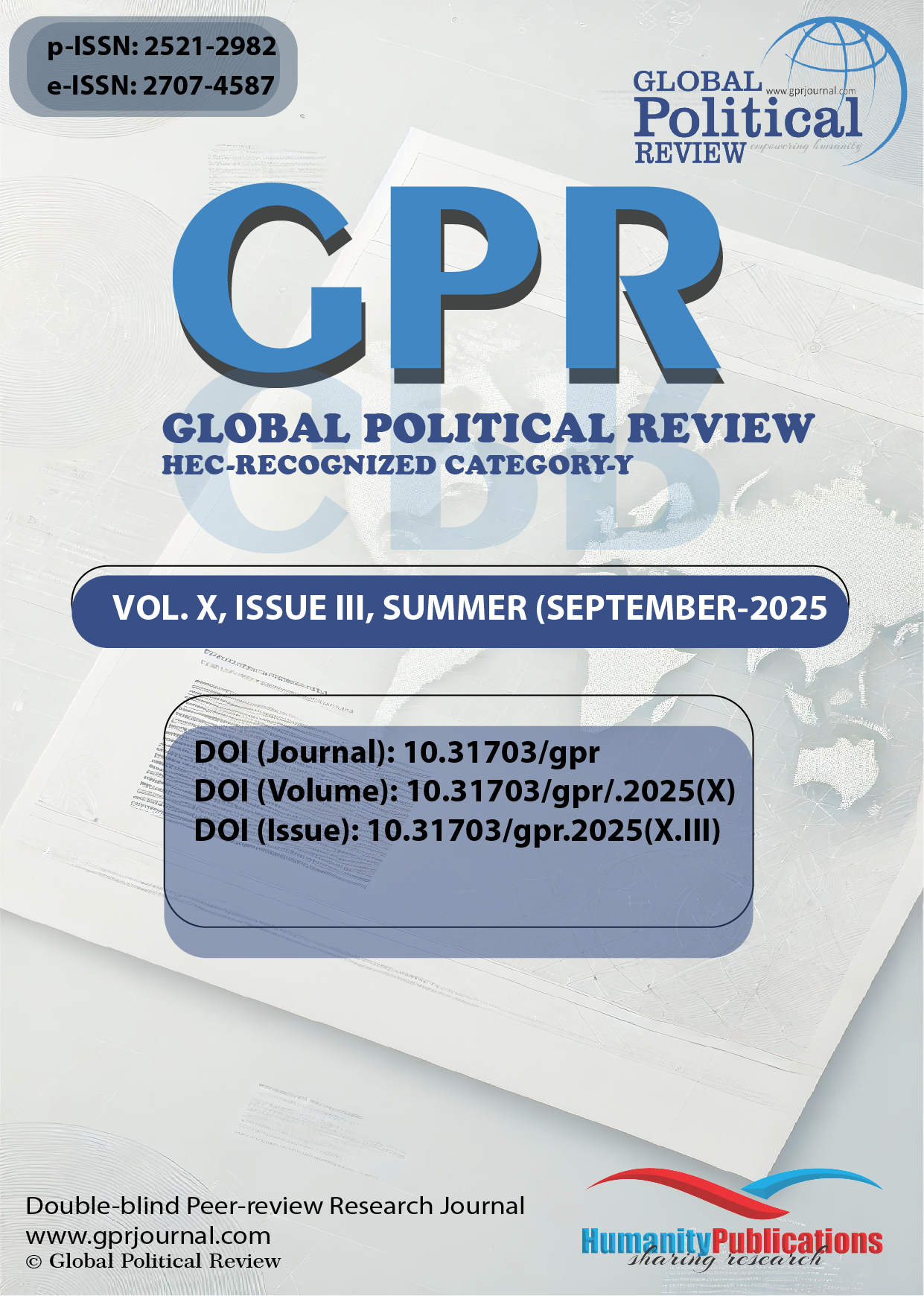 Volume X, Issue III (Summer 2025)
Volume X, Issue III (Summer 2025) 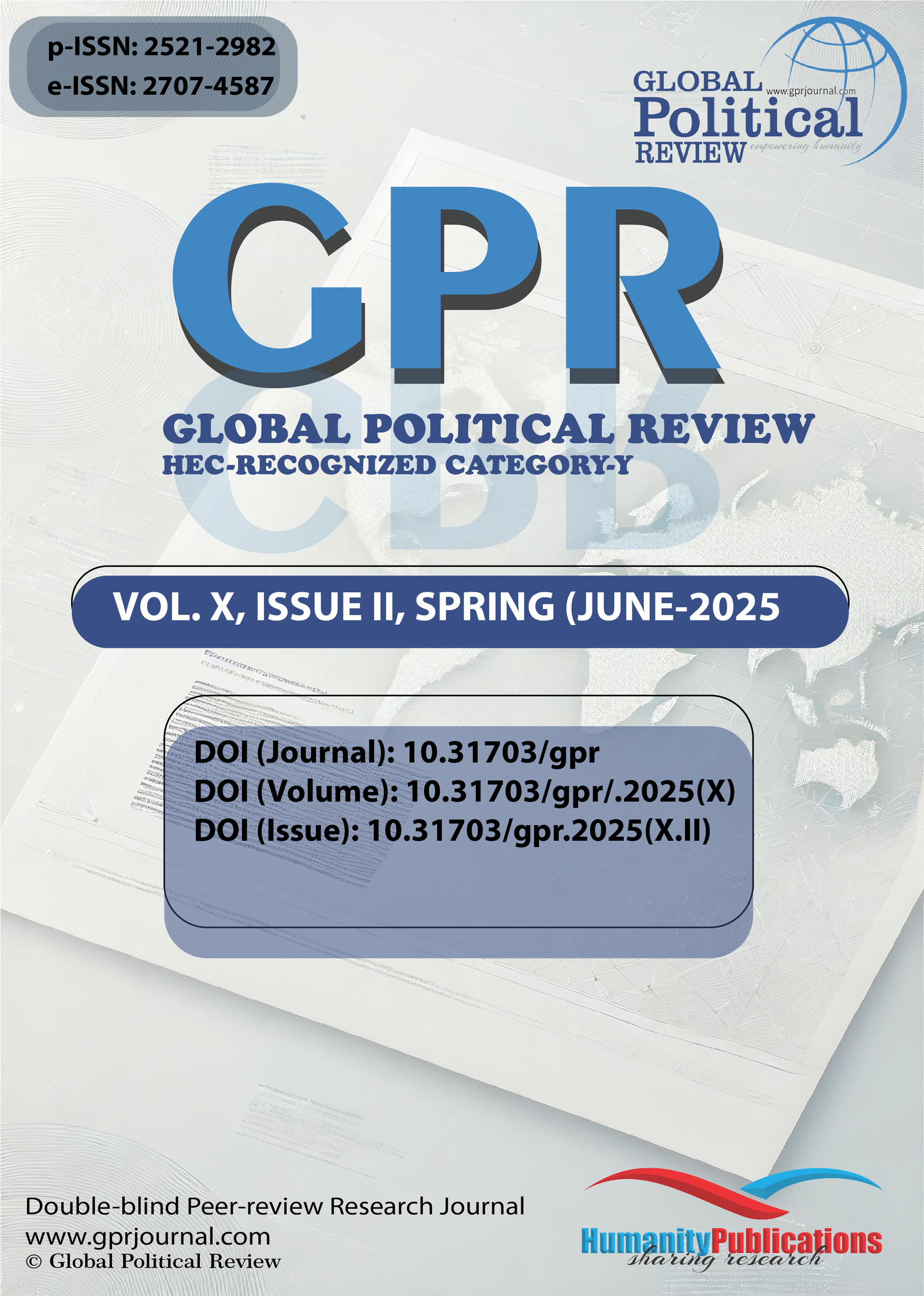 Volume X, Issue II (Spring 2025)
Volume X, Issue II (Spring 2025)  Volume X, Issue I (Winter 2025)
Volume X, Issue I (Winter 2025)  Volume IX, Issue IV (Fall 2024)
Volume IX, Issue IV (Fall 2024)  Volume IX, Issue III (Summer 2024)
Volume IX, Issue III (Summer 2024)  Volume IX, Issue II (Spring 2024)
Volume IX, Issue II (Spring 2024)  Volume IX, Issue I (Winter 2024)
Volume IX, Issue I (Winter 2024) 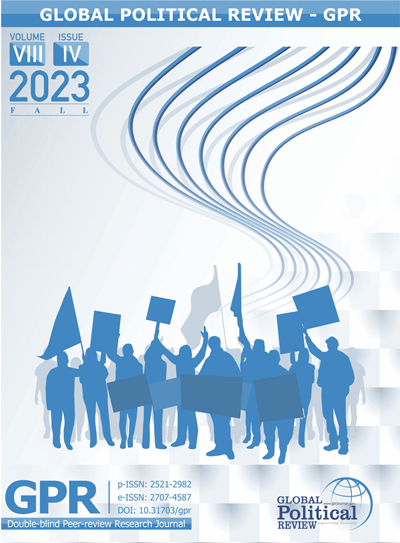 Volume VIII, Issue IV (Fall 2023)
Volume VIII, Issue IV (Fall 2023)  Volume VIII, Issue III (Summer 2023)
Volume VIII, Issue III (Summer 2023)  Volume VIII, Issue II (Spring 2023)
Volume VIII, Issue II (Spring 2023) 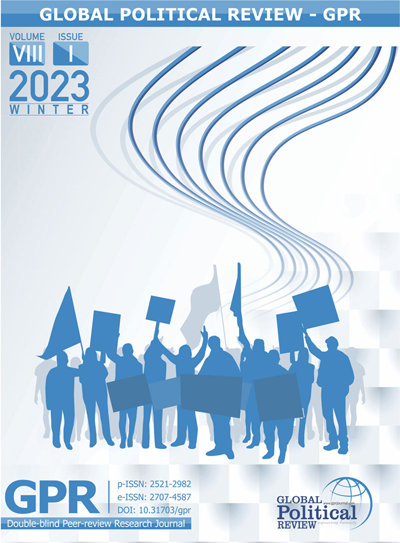 Volume VIII, Issue I (Winter 2023)
Volume VIII, Issue I (Winter 2023) 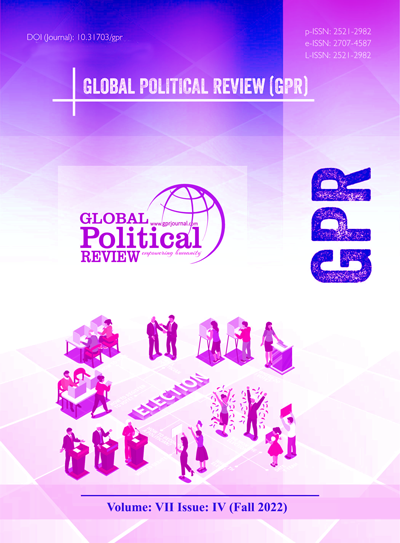 Volume VII, Issue IV (Fall 2022)
Volume VII, Issue IV (Fall 2022)  Volume VII, Issue III (Summer 2022)
Volume VII, Issue III (Summer 2022)  Volume VII, Issue II (Spring 2022)
Volume VII, Issue II (Spring 2022)  Volume VII, Issue I (Winter 2022)
Volume VII, Issue I (Winter 2022) 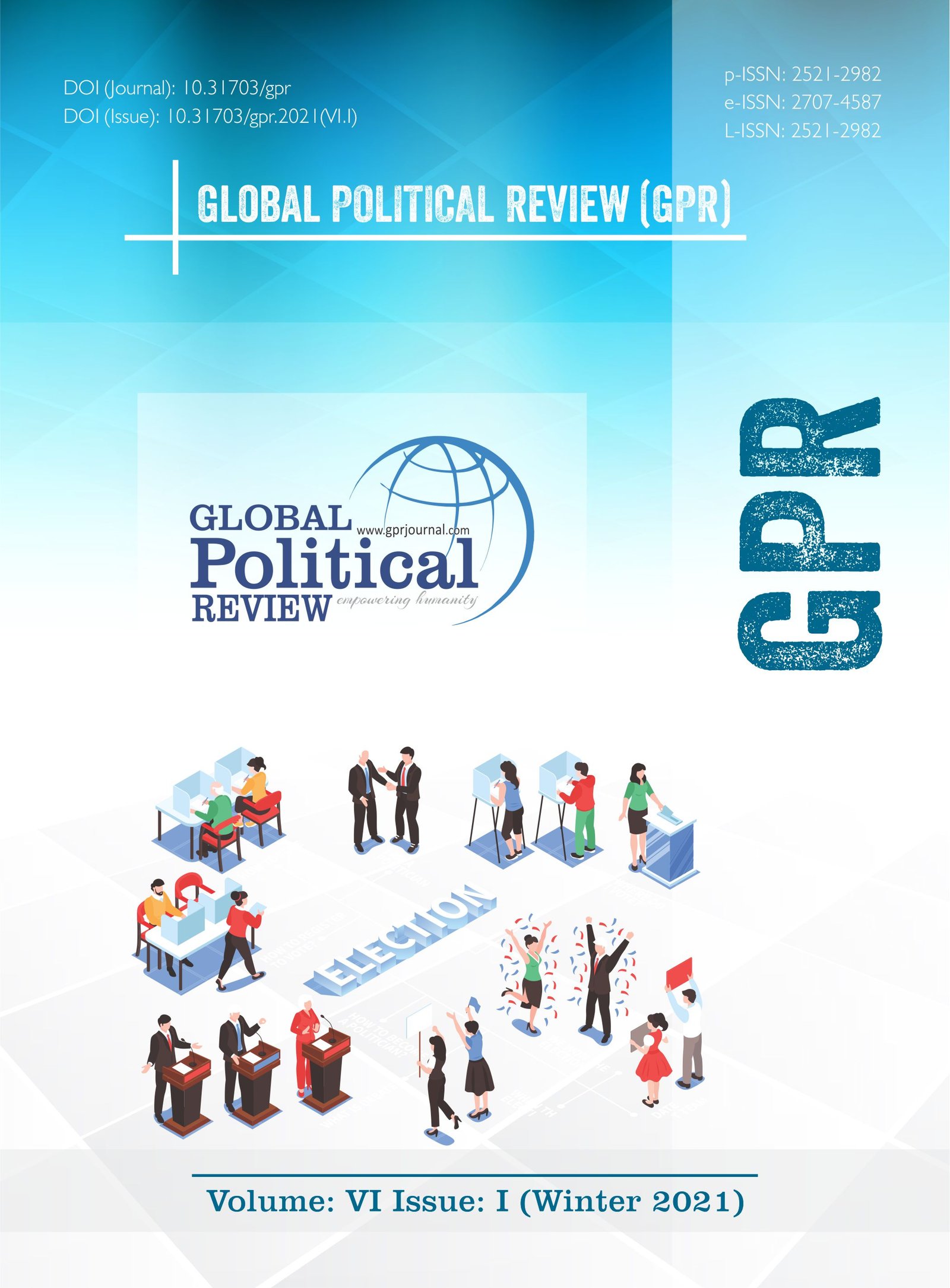 Volume VI, Issue IV (Fall 2021)
Volume VI, Issue IV (Fall 2021) 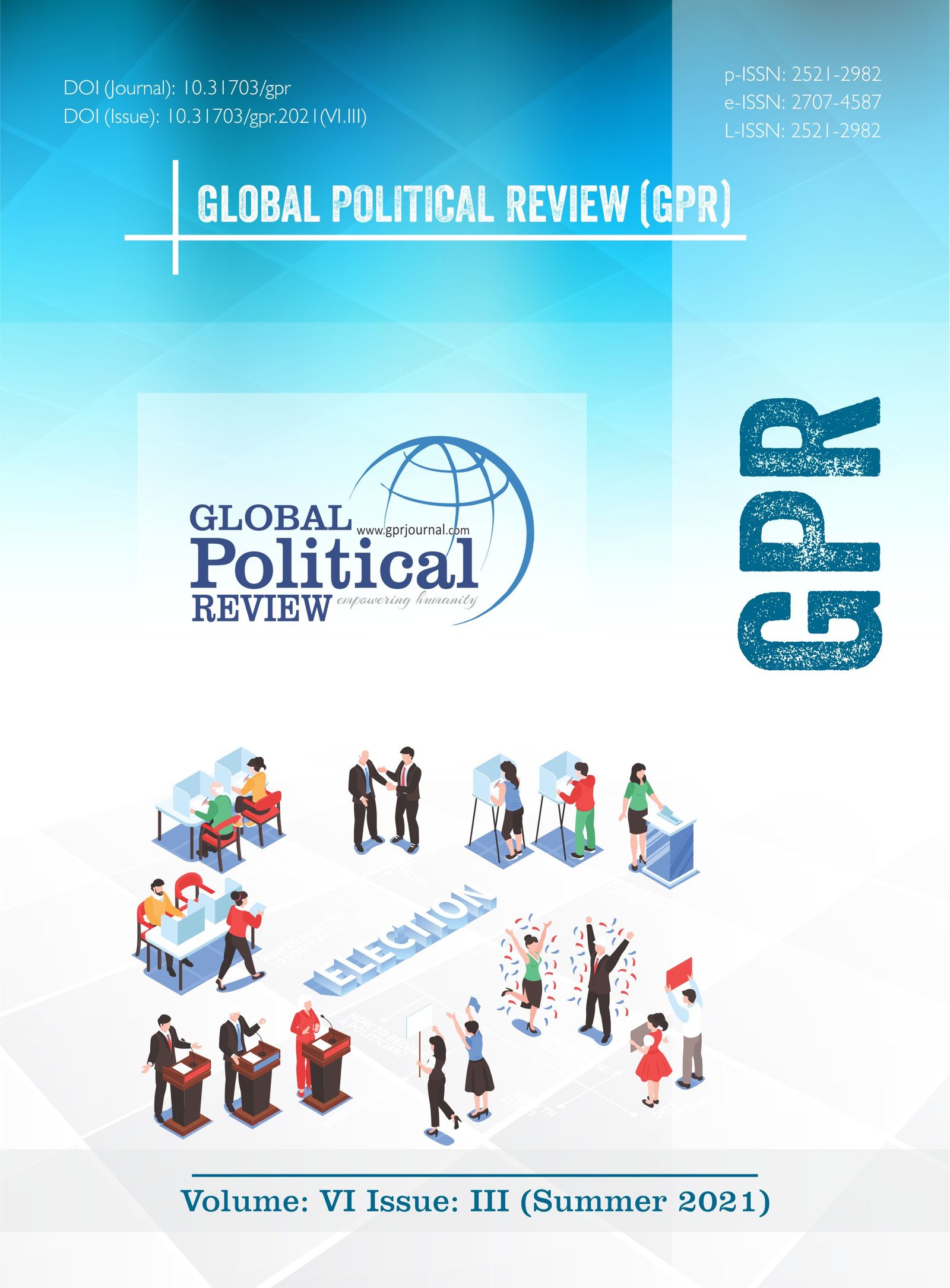 Volume VI, Issue III (Summer 2021)
Volume VI, Issue III (Summer 2021)  Volume VI, Issue II (Spring 2021)
Volume VI, Issue II (Spring 2021) 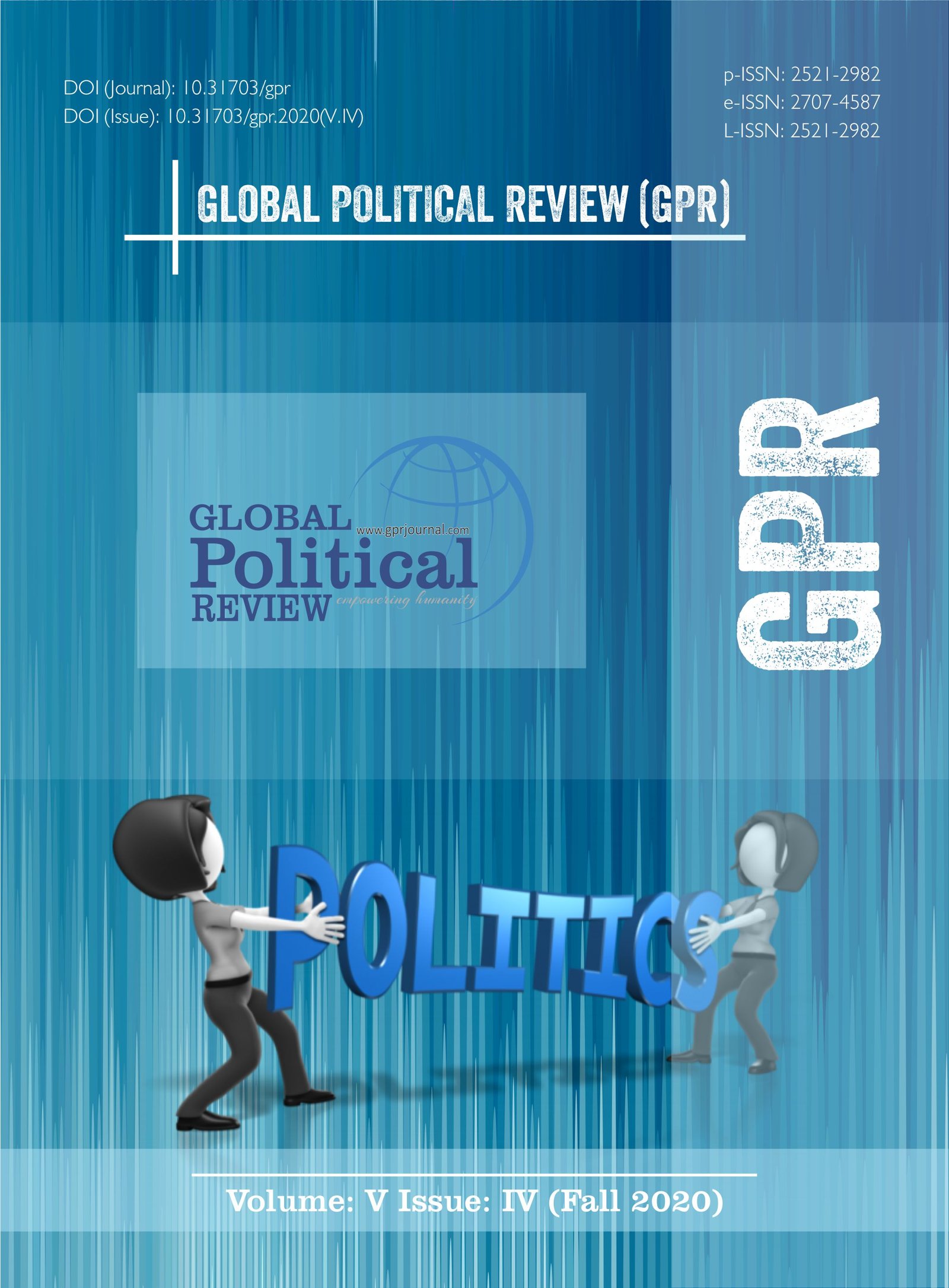 Volume V, Issue IV (Fall 2020)
Volume V, Issue IV (Fall 2020)  Volume V, Issue III (Summer 2020)
Volume V, Issue III (Summer 2020) 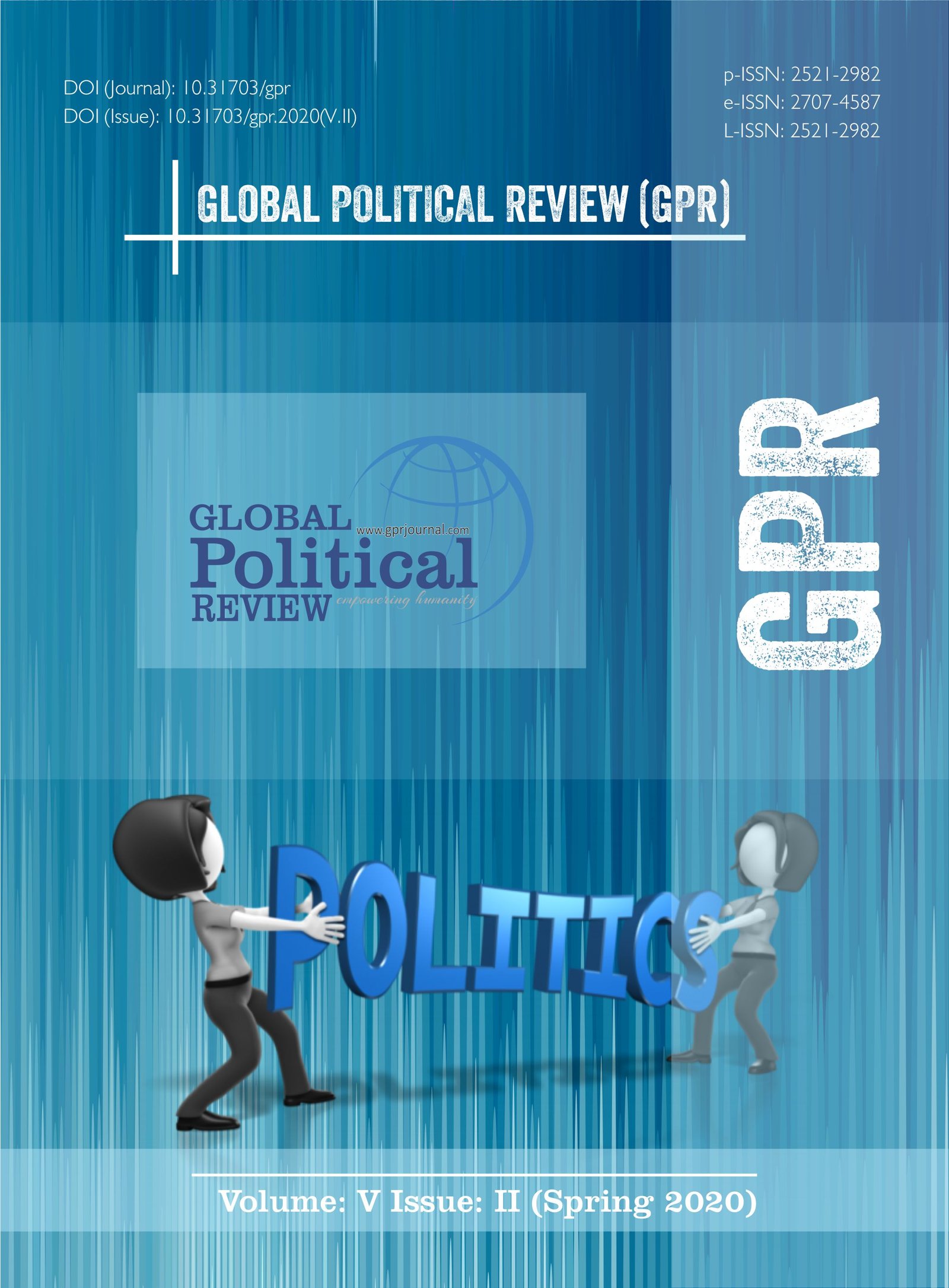 Volume V, Issue II (Spring 2020)
Volume V, Issue II (Spring 2020) 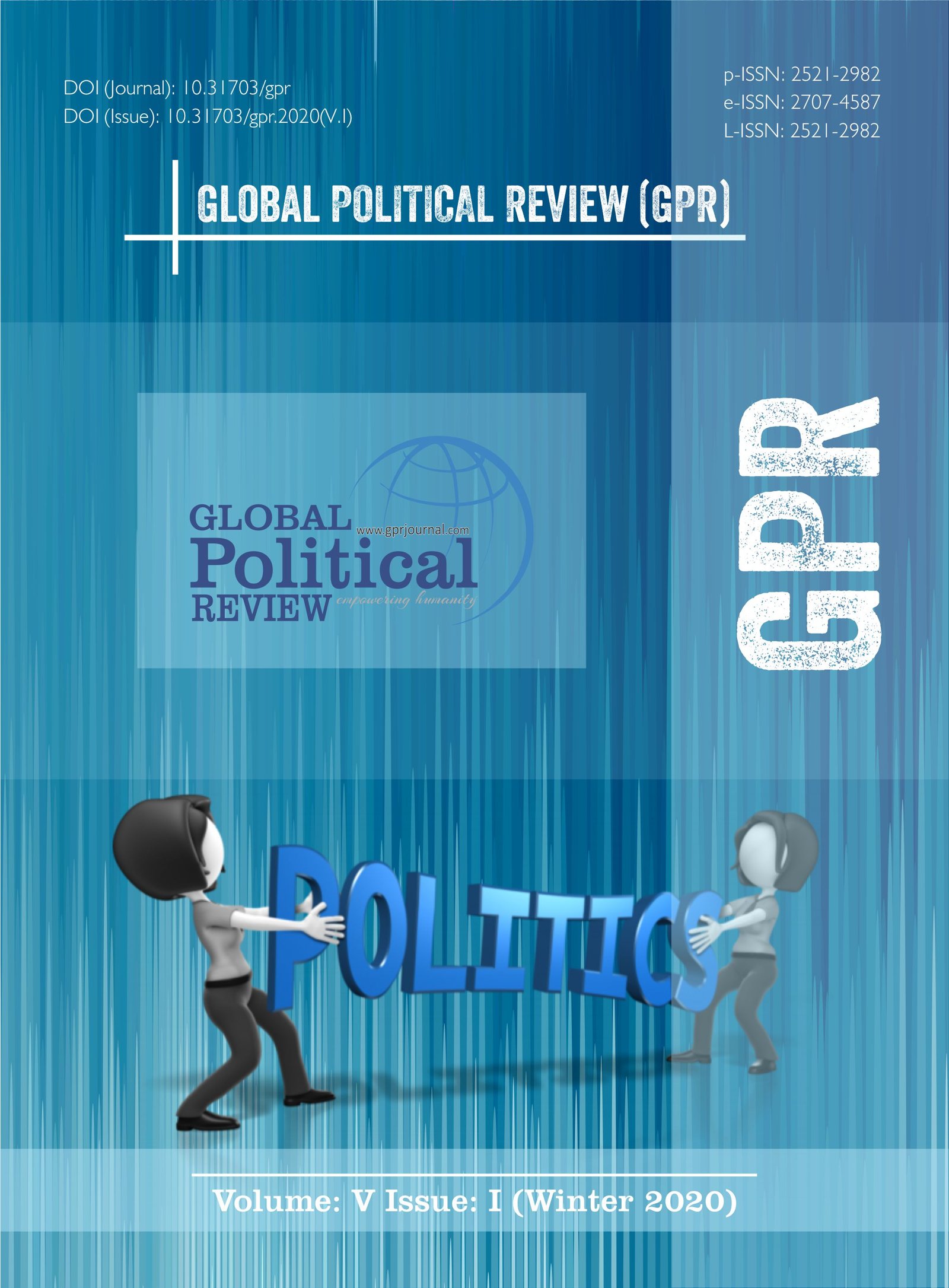 Volume V, Issue I (Winter 2020)
Volume V, Issue I (Winter 2020)  Volume IV, Issue IV (Fall 2019)
Volume IV, Issue IV (Fall 2019)  Volume IV, Issue III (Summer 2019)
Volume IV, Issue III (Summer 2019)  Volume IV, Issue II (Spring 2019)
Volume IV, Issue II (Spring 2019) 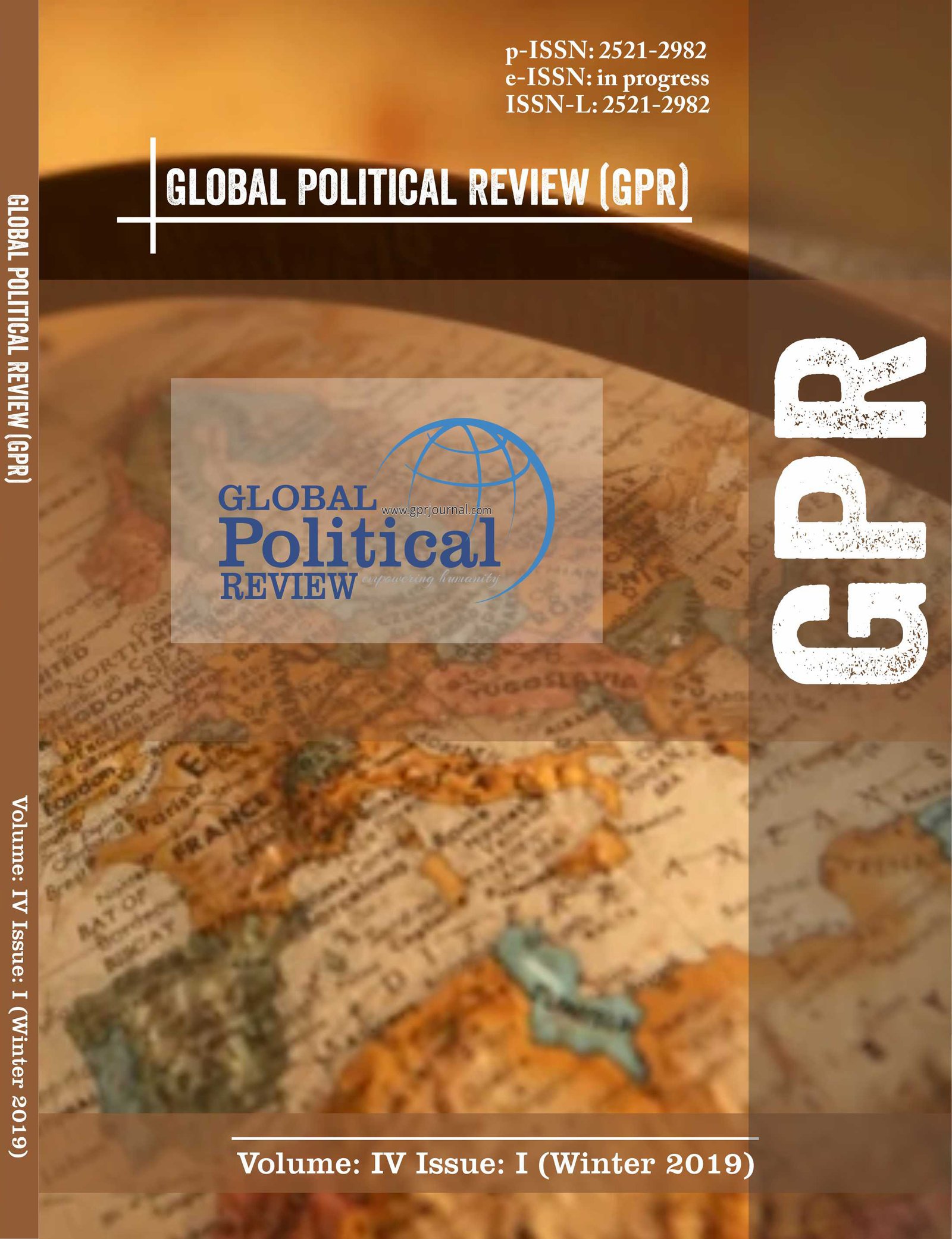 Volume IV, Issue I (Winter 2019)
Volume IV, Issue I (Winter 2019) 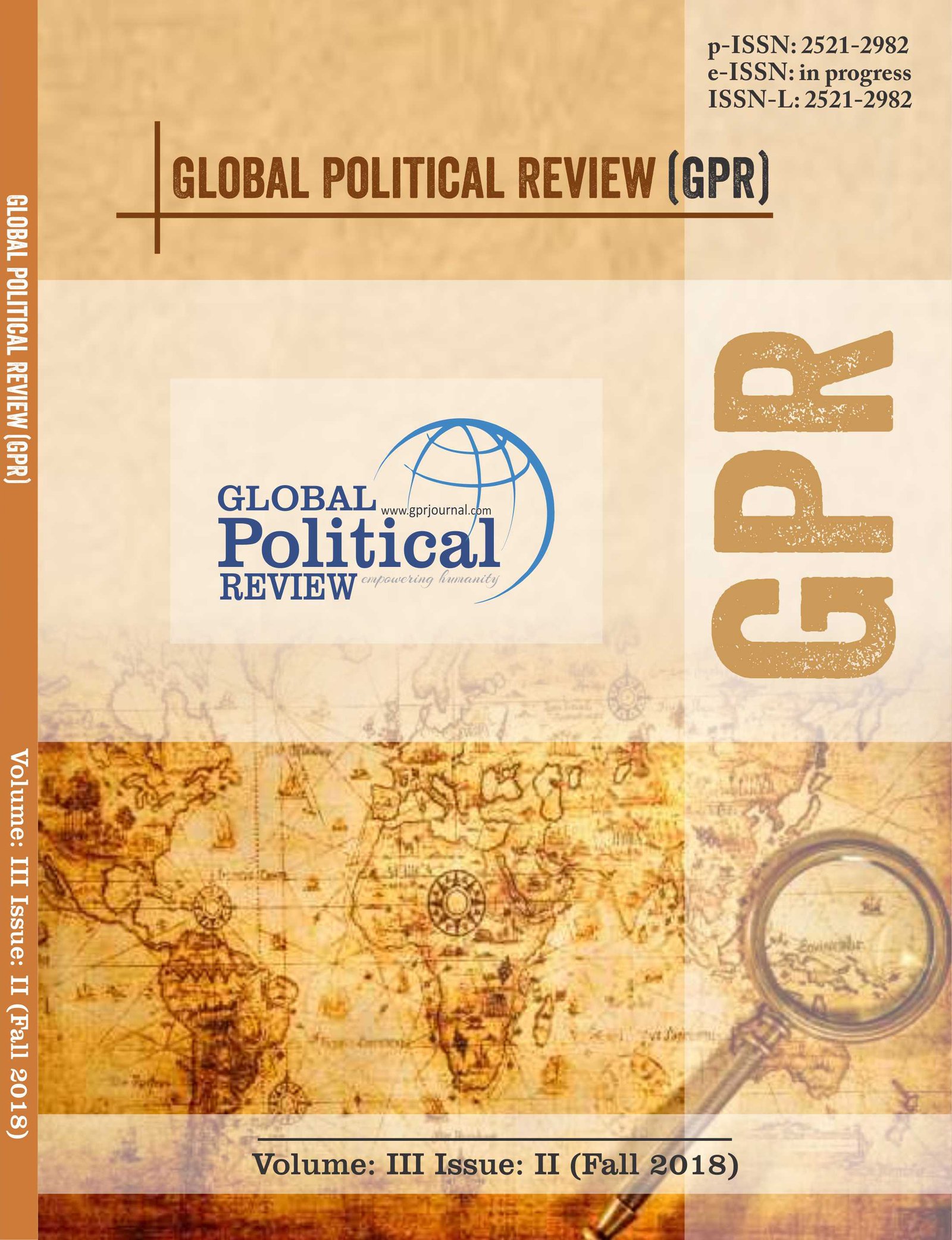 Volume III, Issue II (Fall 2018)
Volume III, Issue II (Fall 2018) 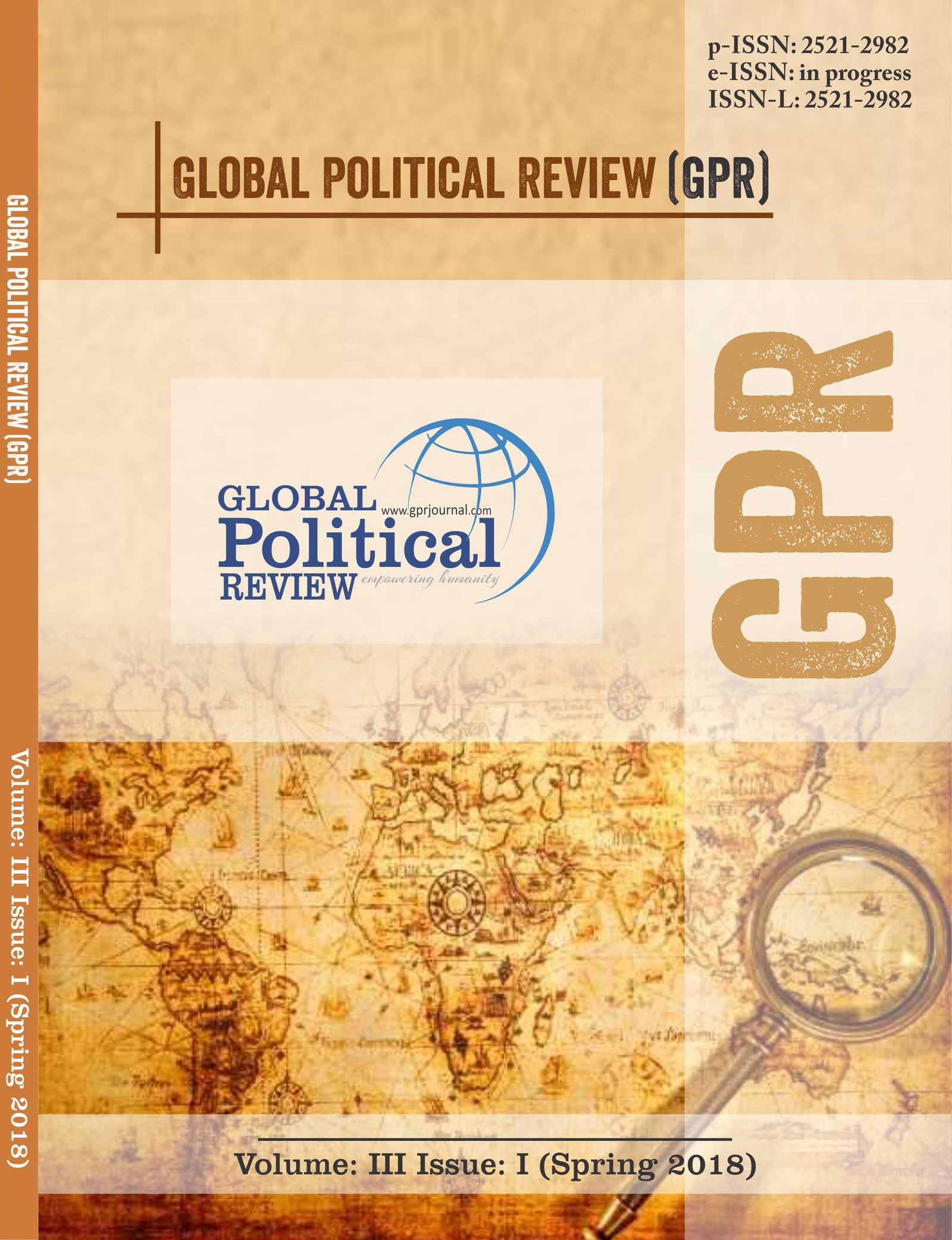 Volume III, Issue I (Spring 2018)
Volume III, Issue I (Spring 2018)  Volume II, Issue I (Fall 2017)
Volume II, Issue I (Fall 2017)  Volume I, Issue I (Fall 2016)
Volume I, Issue I (Fall 2016)